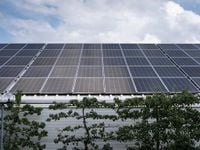The Fribourg-based energy supplier Groupe E has announced significant changes as it grapples with declining sales and profitability. On April 16, 2025, the company revealed plans to cut 188 jobs across French-speaking Switzerland, a move it deems "unavoidable" due to ongoing market challenges.
Since 2023, Groupe E has faced a pronounced decline in the sales of photovoltaic systems and heat pumps, which has severely impacted its earnings for the year 2024. The company cited a decrease in consumption volumes, attributed to unusually mild weather conditions, as a contributing factor to its financial struggles.
In response to these challenges, Groupe E is embarking on a comprehensive restructuring initiative aimed at boosting profitability within its Technology and Infrastructure Directorate (DTI). This review will encompass operations in several regions, including the Bernese Jura, Jura, Neuchâtel, Vaud, Fribourg, and Valais.
Michel Beaud, the Director General of DTI, is also leaving his position immediately as part of this restructuring effort. Jacques Mauron will take over the management of DTI until a successor is appointed. As part of the restructuring process, a consultation with social partners will begin promptly and will last until mid-May 2025, during which a social plan will be developed to support affected employees.
Despite the impending job cuts, Groupe E assures its customers that the restructuring will not impact the availability of its products and services. The company will continue to offer a wide range of services, including electrical installations, photovoltaics, heat pumps, switchboards, telecommunications, refrigeration technology, and water treatment, with the exception of sanitary installations.
Financially, Groupe E reported a slight decline in sales, dropping from CHF 1.10 billion in 2023 to CHF 1.05 billion in 2024. The operating result (EBIT) also fell to CHF 12 million, down from CHF 18 million the previous year. The annual result, however, was CHF 85 million, bolstered by a CHF 55 million contribution from EOS Holding, which has a stake in the Alpiq energy group.
Looking ahead, Groupe E plans to invest CHF 2 billion in western Switzerland over the next decade, focusing on strengthening the electricity grid, developing three district heating networks in Fribourg, the Entre-deux-Lacs region, and Kerzers, as well as enhancing facilities for generating electricity from renewable sources.
In a broader context, the energy landscape in Switzerland is characterized by a high dependency on imports. According to a recent study, Switzerland imports over 70% of its energy needs from other countries. This dependency is set to continue, with domestic resources only sufficient to meet energy demands until April 19, 2025, a date that marks the symbolic 'Overshoot Day.' After this date, Switzerland will rely entirely on imported oil, gas, or nuclear fuel (uranium).
Estimations suggest that Switzerland's energy independence rate will stand at 29.6% in 2025, a slight improvement from 18.8% in 2005. This places Switzerland on par with several other European nations. For instance, Estonia leads the pack with an independence rate exceeding 98%, while Belgium, Cyprus, and Malta lag significantly with rates of 10% or less. France and Germany report rates of 16.6% and 30.2%, respectively.
Switzerland spends an average of CHF 8 billion annually on energy imports, with over 87% of these imports coming from EU member states. However, the Swiss Energy Foundation (SES) warns that EU countries primarily serve as transit points for energy rather than producers. Most of the fossil and nuclear energy imported into Switzerland arrives from regions such as the Middle East, western Asia, the former Soviet Union, the United States, Norway, and the United Kingdom. Notably, a significant portion of the nuclear fuel rods used in Switzerland contains uranium sourced from Russia.
In light of these challenges, SES advocates for the development of renewable energy sources to bolster Switzerland's energy autonomy. Léonore Hälg, Head of Climate and Renewable Energy at SES, emphasizes that the EU will remain a crucial trading partner for energy, particularly in the form of locally produced renewable electricity. The future electricity agreement with the EU is expected to play a pivotal role in shaping Switzerland's energy landscape.
As the nation continues to navigate its energy needs and the implications of job cuts at Groupe E, the focus remains on finding sustainable solutions that enhance energy independence while ensuring the stability of the workforce and the economy.





